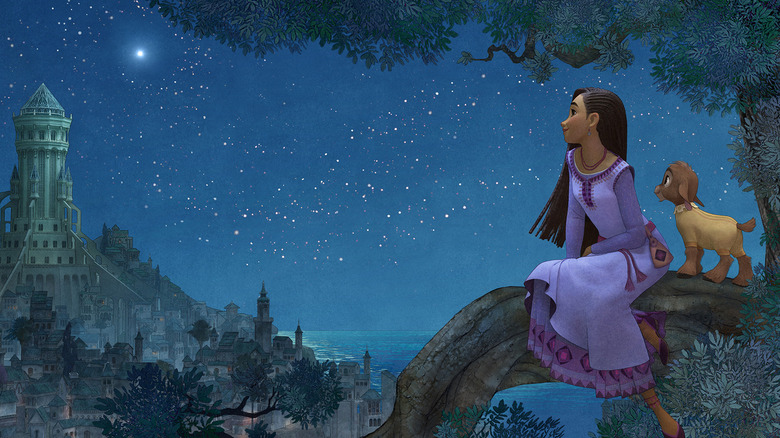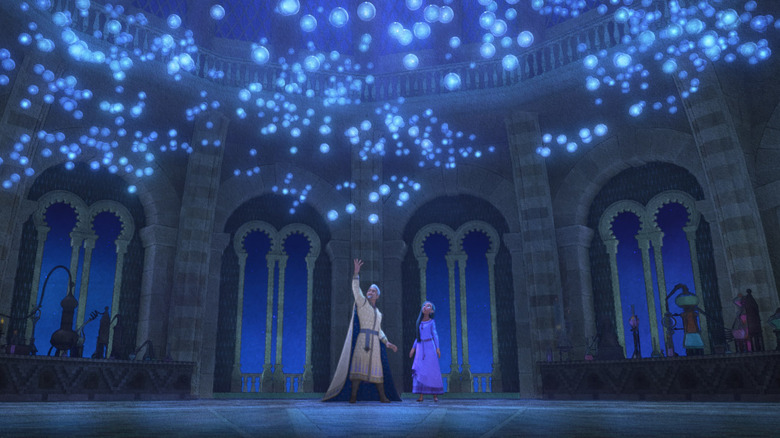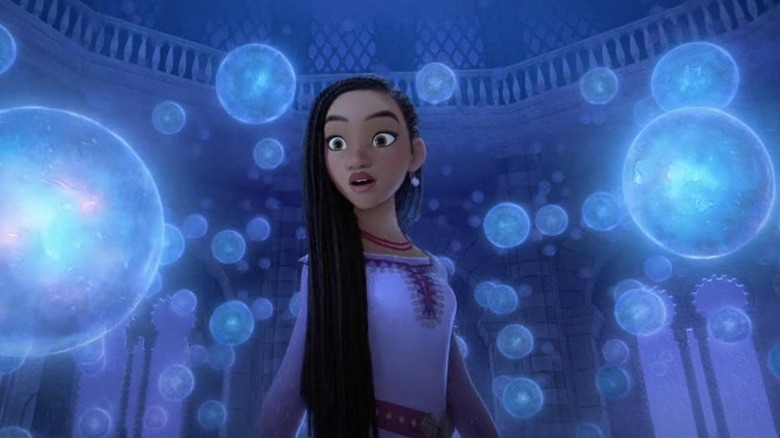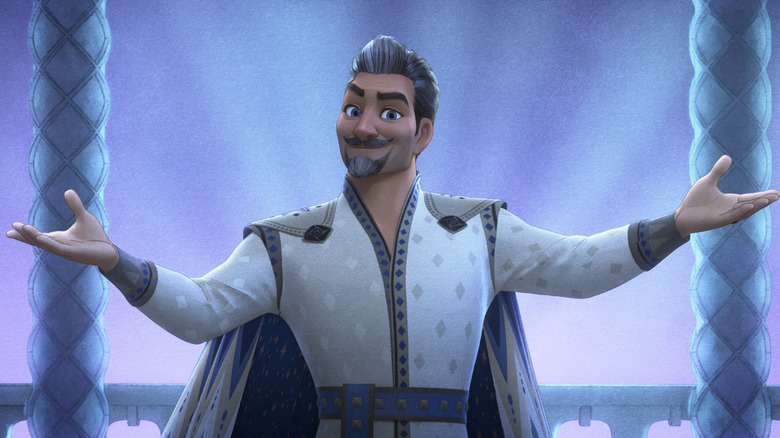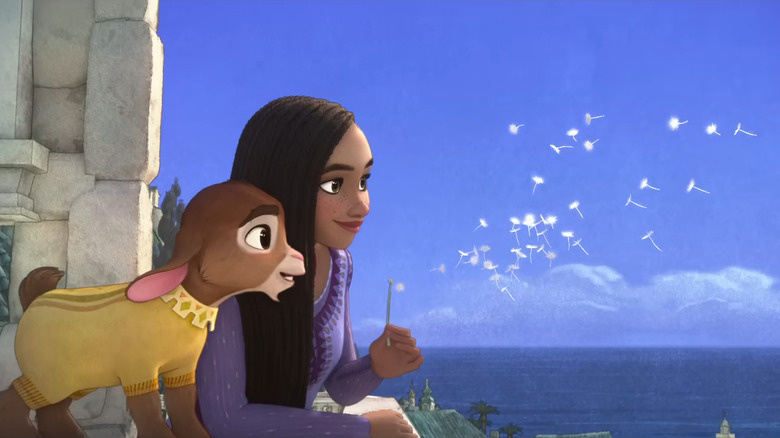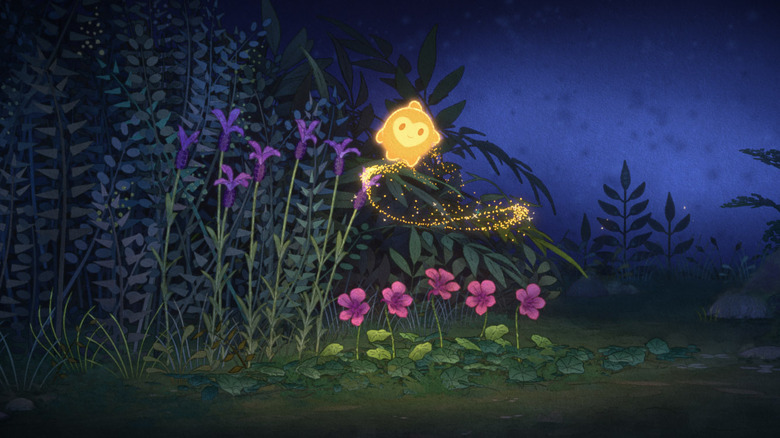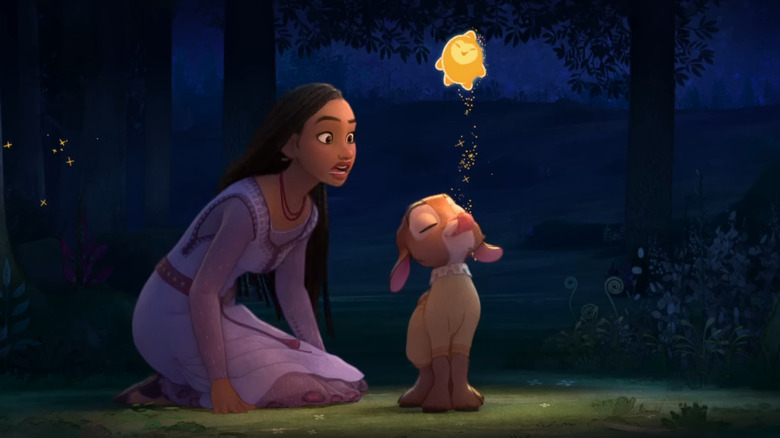Walt Disney Animation Head Jennifer Lee On Setting Up The Next Generation Of Artists [Exclusive Interview]
We're technically in the middle of Disney's centennial celebration, but for the iconic animation studio, the party is just getting started. After news came out earlier this month that nearly 30 restored animated shorts from the Walt Disney Animation Studios vault will be released on Disney+, the studio had a triumphant presentation at the Annecy International Animation Film Festival to reminisce on the past while also looking at the future.
First, the studio presented their latest animated short, "Once Upon a Studio," directed by Dan Abraham and Trent Correy, possibly the most magical thing they've done in years and a short that pays homage to the studio's 100-year-old history, the characters, and the animators that made the studio what it is. Then, audiences were treated to about 20 minutes of "Wish," the upcoming Disney animated musical feature which brings back the Disney villain, and does some cool things with its visuals. That film is directed by Chris Buck and Fawn Veerasunthorn (in her feature directorial debut), and written by Allison Moore and Jennifer Lee, the latter of whom also wrote and co-directed "Frozen" and serves as chief creative officer of Walt Disney Animation Studios.
/Film caught up with Lee shortly after the footage presentation of "Wish," where she talked about the future of Walt Disney Animation Studios, bringing back an actual villain for "Wish," and why animation is so special.
Note: This interview has been lightly edited for clarity and brevity.
'Technology and the artistry are merging'
The short film "Once Upon a Studio" includes a lot of different animation styles, while "Wish" looks different than many Disney films. What sort of experimentation is in store for the studio going into its second century?
Well, what I think particularly with the short and "Wish" is, and I think it's happening across animation, we're finally arriving at that place where technology and the artistry are merging in a way that I think is everyone's dream. I think of the incredible production designer, Lisa Keen, and the painting she did for "Frozen," but then they'd be translated into CG and they'd sort of be degrees away. But now, those paintings, that look, can make it onto the screen. And we've all been working on this for a long time. It's mattered. And with us, we were able to build it on a short scale, but to build it for a feature, we started, I think, when we met with the design team, the dream they said would be to be able to honor those watercolors from "Sleeping Beauty." "Sleeping Beauty" was such an inspiration for "Frozen" in terms of framing, but to get to do it, and we said, "Well, it's our hundredth, we have to have that goal, and they've been working on the technology for years."
I was saying just a couple months ago, we bumped into an issue where we didn't have it lined up to do water. So we had to brainstorm and work together and they figured it out because the scene was too important and they wanted to earn it, and there's nothing like a challenge for a technologist. That's what they want. "What's the next challenge?" So now we're hitting this place, we're going, "Okay, the look can go in many directions. That is so exciting," and it's really going to come down to the identity of the artists themselves coming through more. I think that is the best case scenario.
Building foundations
You talked during the studio presentation about the pairing of fresh talent with veterans, and you yourself were mentored by a veteran of the studio. Why is that important not just at an animator level, but on a key role like a director?
Well, I mean, all of these films are hard. Every one of them is hard to make. One of the things that our veteran filmmakers have is, they've been through it. They've been through a lot. They've had to redo things a lot. They felt the pain of failure, they felt the joy of success, and they have the layers of life. The new generation has talent. I mean, more and more talent out there. And they come in, and to go through your first film, I always say it's going to break your heart a little bit, over and over again, because it's not enough to dream. We all have dreams that we think, "Oh, if we could only make that." You look back at Walt and what it took for him to make "Snow White," and how it almost failed and it was a fight for every frame. There's never a shortcut in every movie.
So with our veteran filmmakers — and obviously you have someone like Eric [Goldberg, veteran Disney animator] who is everything, he is the talent and the years and the fight in him, and we've got an apprentice program that we've formed for the new generation of hand-drawn. And he's not just bringing skill this way, he's bringing those layers of life. To me, none of this is for the faint of heart. I think being creative, you are always vulnerable. So what we can do is build a good foundation and it's just important. For me, that's the big focus of where I want to go from here, is getting those voices that I'm finding so fresh and exciting, but how do you help them succeed? Because that takes more than just talent. [laughs] We all know, it's a fight. So I think that's what I'm most excited about.
'We've wanted to really celebrate a delicious villain for a while'
One thing that was really exciting about the footage was the villain. Why was that important to have in the film, and from your perspective, what makes a great Disney villain?
Yeah. We've wanted to really celebrate a delicious villain for a while. And we've had fun really straying where, I think in life, for a period of time we were exploring how the villain is not always so clear. Sometimes it's ourselves or thematic. But that idea of those villains, and the song, and we love that deliciousness of their evil. [laughs] So the daunting task of creating one, I think what really worked for us with this is we listened to our story artists, we listened to our audience, and people are saying, "I want him not just to be arch, though, I want to know" what we didn't always do, which was tell you why or how did they make those choices? You sort of meet them fully formed and they could be wonderful, but what makes Magnifico different? So we said, "Okay, from the first frame of the film, you're going to feel the journey of this person from the relatable part of ourselves." You get to see, as you saw in a scene when the villain and the protagonists are completely aligned and then you see as their philosophies diverge, you get to watch ... because we never want to say, "Anyone like this will make this choice." It's that this man makes this choice, this woman makes that choice, and it's so fun to watch. And Chris Pine was big on that and it's part of why we wanted to work with him. He's so smart, he holds the character accountable. So it was just so fun to build Magnifico with him, because you couldn't just take anything for granted. So for me, what's been great is getting ... you only saw the first couple of scenes, but getting to that place with him that we think is delicious, but watching him get there has been such a thrill ride for us.
'That did a lot for us in terms of trust'
From a production standpoint, we're three years into the pandemic. How has that impacted the way the studio looks at new projects? Has anything changed in your approach to either the stories you want to tell or the animation pipeline?
I think, in a good way, what we learned about ourselves during Covid was, we built "Raya" and "Encanto" completely [separately]. No one was together and the whole productions were done from home. So I felt like we showed that we understood each other enough and we could carry the same vision from multiple homes. And that did a lot for us in terms of trust. So what we have now is this place where, as people are coming back and this collaboration that it's kind of like we've been through a lot together, so there's no formality, and that makes, for me, I think that makes for a much more wonderful creative space. But I think the big thing is, it's not even about Covid, it's about, as I say, that new generation. I'm more aware than ever of their power and what they can do, but I'm also more aware of that responsibility.
So where I look at is what excites people about storytelling evolves and it's hard when you're getting old to look to yourself. I have certain things I can bring, but it's my job to make sure that I'm spotting that talent and giving them that platform and support and then letting them take it. And I think that's how Eric is helping new generations. That's what we've done that keeps us Disney, is continuing to let that new generation help us evolve, but setting them up for success. So I feel like that has less to do with Covid and just more to do with, here we are. I mean, I've been in this role five years. I've been in the studio 12 years. I came in under 40 and now I'm over 50. So it's time. I think of that. And you hear them banging on the door and they challenge the storytelling, and it's great.
'They're artists. They're not Disney artists. They do work for Disney, but they bring their soul and their tastes come with them'
Serving as both a writer and a producer on "Wish," what was the key element that made this right for the hundredth year celebration?
Well, what I love though is we all started talking as a group, all the directors would get together and we'd meet with story artists and just leave it open and talk about all these fantastical fun ideas. But what kept coming back were certain things — yes, the villain, but this idea of the wishing on stars. That little clip we showed [a montage of Disney characters throughout the years looking at the stars], that was put together before we had the film. Someone just put it together who was inspired to say, "This is something that's a part of us." And you felt it come. Then Chris, he didn't set out to direct it originally, but it spoke to him so clearly. And Fawn, she was such a powerhouse right away.
Then what happened with us is as we were developing the character, Star changed quite a bit. Star originally could talk and took different forms, sometimes human form. And it was really saying, "But that's not what Star is. Star is hope, possibility, wonder — those things don't have the power, they have the power to inspire you." And then I started watching panda bears and how ridiculously funny they were and felt that curious innocence and we said, "What if Star is just that?" And then they said, "You can see this. I think you need to write a draft." And luckily Allison Moore was there in the room every day, but I could come in. But it didn't happen where it was no moment of an order. It was more of, as people were drawn to it and they got it, they just formed the team. And I felt very lucky that, when they asked me to write it and I had no time, but how could I not? It was such an honor.
Disney has always been a studio strong in its traditions, and its recognizability. I'm curious, with something like "Wish," where do you look for pushing boundaries while also keeping those traditions?
All our artists are looking all the time. They're artists. They're not Disney artists. They do work for Disney, but they bring their soul and their tastes come with them, and what they see in the world inspires them. That's great about this industry. Every day there's always buzzes of what's going on. But I think if I look at "Tangled" as a good example of understanding the fairytale, our first sort of CG princess and this nod to the past, but this embracing of this technology, which was a little scary, I'm sure. I wasn't there, so I can only guess. But to say, the approach they took, it kind of showed us where we could go and be more playful. If there hadn't been "Tangled," there would not have been "Frozen." So I'm very grateful that we took some bold steps.
'It's the greatest form of flattery, I guess'
There's been a lot of live-action remakes of Disney movies, both classics and newer ones. From an animation standpoint, does that push you to make visuals more distinct or even just "easier" to adapt? Does it at all affect the mentality going into a new project?
No, I mean, very, very politely, we completely build these independently. We don't think ahead of the live-action. We're honored if it happens. It's the greatest form of flattery, I guess. But I do think, one of the things I love — to me, what defines animation is it is truly transportive in a way that it speaks to your imagination, not to your reality. And so I think in terms of, personally, the looks that I'm inspired by, of where I do feel I'm in a believable world and it feels alive, but it is wholly nothing of our world. It's a place that I can truly escape to. I think that means a lot to a lot of us. So to me, the easy part of it is, if the goal is reality, the technology can go that way. But animation is not about that. What I love about animation is, it starts with a dream and everything is built and the more we can be transported to something we've never seen, the more excited I get.
Lastly, when it comes to "Wish" or any future projects as you are working through development, especially just that first brainstorming phase, what is the balance or even just your personal feelings in terms of wanting to look back at the history of Disney versus looking at what is possible now with new technology and new ideas?
Yeah, yeah. For me, there's not an overall philosophy about it. I do think it's director and artist by artist. And so what we'll do on one film, we won't do on another, and we'll try a whole different ... "Zootopia" and "Wreck-It-Ralph" are nothing like "Frozen." And I think that we'll do that for everything where we take it one film at a time. I think what I always have to trust is what inspires those artists. But I do think when we think about the legacy, to me, there are certain things that I think are wholly Disney, which are films that give hope. Films where you can escape, where you feel like you belong, that you feel that it can become yours. And there's always an element, hopefully, of joy. But we're not afraid to go into deep, dark places. All fairytales do.
But I think that's what we do say is a part of who we are. And I think for so many of us there, it's this thing we share, which is for so much of our lives, starting from our first memories to now, Disney was a place for us to go no matter what was happening in the world, and we could feel this escape. And it was an escape that left you feeling things are possible. I do think that's part of who we are, foundationally, that we all think about. How we get there should be very different each time. And obviously the musicals, the musicals, the musicals, because we love them.
"Wish" arrives in theaters on November 22, 2023.
